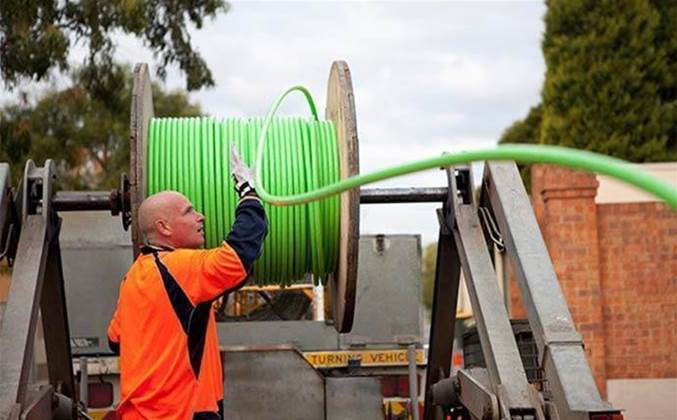NBN Co has laid out a fresh proposal to scrap separate bandwidth charges and introduce flat-rate pricing across all fixed-line and wireless plans by July 2026.

The company is also now proposing flat-rate price reductions on plans 100Mbps and above, with the biggest price cuts aimed at its up to gigabit residential tier - a clear nod to its intention to get as many customers with gigabit-capable infrastructure using it to the fullest extent.
In addition, NBN Co said it will place restrictions on its ability to recover sunk costs from its retail prices, cap its prices for a period “on average at CPI”, and enshrine service quality standards in the SAU, instead of leaving them to the wholesale broadband agreement (WBA) process.
How the proposed changes will be received by retailers, the ACCC and the government remains to be seen.
Though the government has flagged changes to the statement of expectations (SOE) concerning NBN Co - and retailers are optimistic that NBN Co will be better positioned to pursue a more radical change agenda - it’s clear NBN Co is still somewhat constrained.
“NBN Co’s mandate to operate on a standalone commercial basis as a government business enterprise (GBE) has not changed,” the company said in a discussion paper sighted by iTnews.
“It remains imperative that the commitments NBN Co makes in the SAU (and the WBA) are set so as to support a sustainable NBN, including to provide NBN Co with the opportunity to continue to efficiently invest in the network consistent with government policy and the expectations of RSPs and end users, and to achieve and maintain a standalone investment grade credit rating.”
NBN Co said the changes proposed today, including a three year phaseout of connectivity virtual circuit (CVC) bandwidth charges altogether - “do not come without cost.”
The company anticipates “material reductions” both to short-term revenue and its “ability to monetise the increased usage of the network that will inevitably take place over coming decades.”
Absent a formal restructure of the way NBN Co - and its sunk costs - are to be treated by the government, NBN Co effectively asks retailers for their understanding, by seeking from them a list of priorities and trade-offs through upcoming consultations.
The company needs to have an agreeable special access undertaking (SAU) in place by mid-2023 to meet a government-imposed timeline.
Phaseout of CVC
Though NBN Co has previously argued against flat-rate prices on plans 50Mbps and below, it is now proposing to implement flat-rate pricing, but not immediately.
“An immediate transition to $0 CVC pricing would mean an increase of the effective access charge that RSPs will pay for low usage customers,” NBN Co said.
Instead, NBN Co proposes to move to flat-rate pricing “by no later than July 1 2026”. Part of this move will be a gradual reduction of CVC “overage” - excess - charges on 50Mbps and below plans.
NBN Co argues that a more immediate introduction of flat-rate prices on plans 50Mbps and below could increase fixed-mobile substitution.
“Higher access charges under an AVC-only model will increase incentives for RSPs to migrate low-usage customers off the nbn network and onto fixed wireless networks - particularly where those end users are customers of a mobile network operator,” the company said.
“The proposed transition period will reduce short-term incentives to move low-usage customers off the NBN network, and as access speed and usage on the NBN network increase over time, enhance the utility and value these low-usage customers gain from the NBN.”
NBN Co acknowledged that not all RSPs would be happy with the timeline, but implored them to understand the reasons for it.
On its proposed flat-rate prices for services 100Mbps and above, NBN Co is offering a sweetened deal for RSPs and users, in the form of even cheaper starting prices.
A 100/20 service would start $5 a month cheaper at $55, while 250Mbps and up to gigabit plans would start $10 a month cheaper at $60 and $70 a month respectively.
However, there are still yearly price rises embedded in the structure; NBN Co is simply proposing a different quantum and method of calculation.
The method is effectively price increases pegged at CPI for an “initial glidepath” period, before shifting to a variation.
NBN Co said the model is based on one used in the also-regulated energy sector.
Timing constraints meant that iTnews was unable to properly analyse this prior to publication.
The discussion paper will officially take submissions through to September 2; however, a forum in Sydney on August 18-19 convened by the ACCC will also be an opportunity for industry to flesh out more on the topics.



.png&h=140&w=231&c=1&s=0)
_(23).jpg&h=140&w=231&c=1&s=0)

_(20).jpg&h=140&w=231&c=1&s=0)





 iTnews Executive Retreat - Security Leaders Edition
iTnews Executive Retreat - Security Leaders Edition
 iTnews Benchmark Awards 2026
iTnews Benchmark Awards 2026
 iTnews Cloud Covered Breakfast Summit
iTnews Cloud Covered Breakfast Summit
 The 2026 iAwards
The 2026 iAwards











_(1).jpg&h=140&w=231&c=1&s=0)



